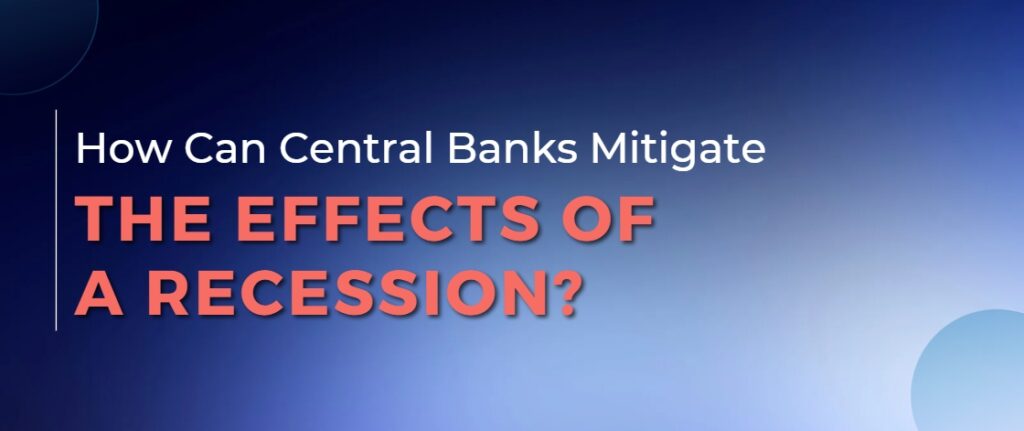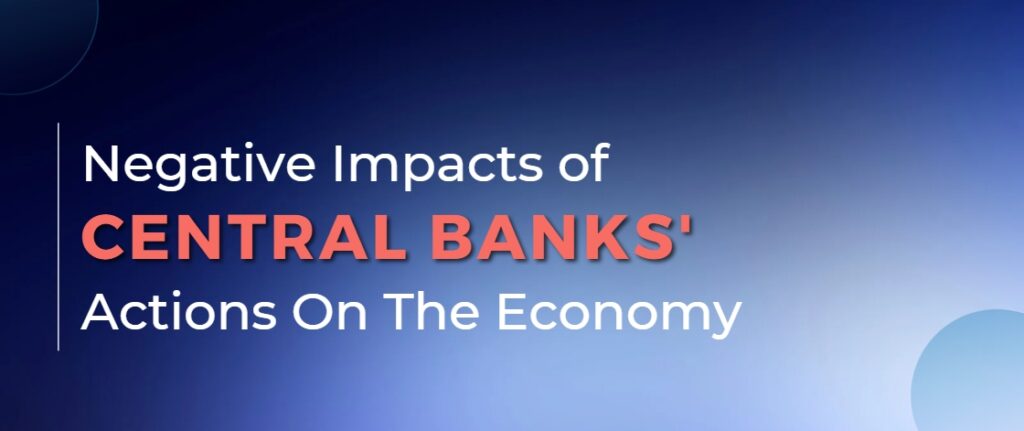
In times of economic turmoil, central banks play a crucial role in mitigating the adverse effects of a recession on the financial system. With their tools and policies, central banks can influence interest rates, regulate the money supply, and stimulate growth. The recent COVID-19 pandemic has caused a significant economic downturn, putting the spotlight on the role of central banks in times of crisis.
Today, we will explore the banks’ recession world and central banks’ critical role in ensuring financial stability during these uncertain times.
Let us start by understanding what central banks are.
What are Central Banks?

Central banks are financial institutions responsible for managing a country’s monetary policy and regulating its financial system.
Examples- Federal Reserve in the United States, the Reserve Bank of India, the European Central Bank, and the Bank of Japan.
They are often government-owned or quasi-governmental entities tasked with maintaining price stability, controlling inflation, and supporting economic growth.
The functions of central banks in the global economy can have far-reaching impacts on individuals and businesses. In the event of the next recession, central banks may use various tools, such as interest rate adjustments and quantitative easing, to stabilize the economy and maintain financial stability.
In the next section, let’s understand the role of central banks in the economy in detail.
Role of Central Banks in the Economy

Central banks play a vital role in the economy, impacting various sectors and aspects of the financial system. Here are the key ways in which central banks influence the economy:
- Monetary Policy- One of the primary roles of central banks is to regulate the money supply and control inflation. They achieve this by setting interest rates and managing monetary policy. During a recession, central banks may lower interest rates to stimulate borrowing and investment, thus spurring economic growth.
- Lender of Last Resort- Central banks also act as a lender of last resort during financial stress, providing liquidity to banks and other financial institutions that may be struggling. This can prevent bank runs and other forms of economic collapses that can harm the economy.
- Financial Stability- Central banks are responsible for promoting financial stability in the economy. They may regulate banks and other financial institutions, enforce transparency, and implement risk-management policies.
- Exchange Rate Management- Central banks also play a role in managing exchange rates to ensure they remain stable. This is important for maintaining international trade and investment.
- Economic Data Analysis- Central banks collect and analyse economic data to inform their decisions on monetary policy and other areas of the economy. They also provide economic forecasts that can help individuals and businesses prepare for economic collapse.
Thus, central banks are essential for maintaining financial stability and promoting economic growth. Next, let us look at how central banks can mitigate the effects of a recession.
How Can Central Banks Mitigate The Effects of a Recession?

Recessions can significantly impact the economy, causing job losses, decreased economic activity, and other harmful effects. Central banks can play a crucial role in mitigating the impact of a recession and promoting economic recovery. Here are some of the ways in which central banks can accomplish this:
- Lowering Interest Rates- One of the central banks’ most common tools during a recession is lowering interest rates. This can stimulate borrowing and investment, which can lead to increased economic activity and growth.
- Open Market Operations- Central banks can also use open market operations during a recession to stimulate the economy. This involves buying securities from banks and other financial institutions, which injects money into the system and promotes lending.
- Quantitative Easing- Quantitative easing is another tool that central banks can use during a recession. This involves purchasing large amounts of government bonds and other securities to increase the money supply and stimulate economic activity.
- Forward Guidance- Central banks may also provide forward guidance, which involves communicating their monetary policy plans to the public. This can help individuals and businesses make better decisions and prepare for the future.
- Fiscal Policy Coordination- Central banks may coordinate with governments to implement fiscal policies that can support the economy during a recession. For example, governments may implement stimulus packages or tax cuts to support economic growth.
- Banking Regulation- Central banks can also regulate banks and other financial institutions to prevent economic instability and promote financial stability during a recession.
The Federal Reserve implements monetary policy in the United States and supports the economy during a recession. The Fed seeks a recovering economy and mitigates the effects of the next recession through a variety of tools and policies.
Central banks need to use these tools effectively to promote economic growth and stability during times of economic turmoil. Let us next look at how central banks’ actions affect the entire economy.
If you need some ideas about what to read next, here they are:
- The Impact of Geopolitical Tensions on the Global Economy and the Risk of a Recession
- Should We Prepare For A Recession?
- Fiduciary vs Non-Fiduciary Accounts: Differences & How They Impact The Investors’ Financial Decisions
- Avalanche & AVAX: Current & Past Market Performance, Investment Potential in 2023, & Future Outlook
How do Central Banks’ Actions Affect the Overall Economy?

Central banks’ actions can positively and negatively impact the economy. Let us discuss both kinds of impacts individually.
Positive Impacts of Central Banks’ Actions On The Economy
- Promoting Economic Stability- Central banks can help encourage economic stability by using monetary policy to control inflation and stabilise the economy during a recession.
- Supporting Economic Growth- Lower interest rates and other policies can encourage borrowing and investment, stimulating economic growth.
- Mitigating Financial Instability- Central banks can act as lenders of last resort and regulate banks and other financial institutions to prevent financial instability during a recession.
- Managing Exchange Rates- Central banks can help manage exchange rates to promote international trade and investment.
Next, let us look at the negative impacts of the central bank’s actions on the economy.
Negative Impacts of Central Banks’ Actions On The Economy

- Inflationary Pressures- Central banks’ policies, such as low-interest rates and quantitative easing, can lead to inflationary pressures, which can harm consumers and businesses.
- Debt Accumulation- Central banks’ policies can also lead to increased government debt, which can create long-term economic challenges.
- Economic Bubbles- Central banks’ policies can contribute to economic bubbles, such as the housing bubble, which can lead to financial instability.
- Unequal Distribution of Wealth- Central banks’ policies can contribute to the unequal distribution of wealth, which can harm low-income individuals and communities.
During a recession, central banks’ policies and tools, such as preparing for economic collapse and implementing an effective monetary policy during the recession, can mitigate the effects of financial instability and support economic growth. However, it is essential for central banks to carefully balance their policies and consider both the short-term and long-term impacts on the economy.
In the final section, let us look at an investment alternative that can help you & your portfolio combat recessionary pressures with its unique investment strategies.
The Bottom Line

We have seen that central banks play a critical role in mitigating the effects of a recession and supporting economic growth. Central banks use various tools and policies to promote economic stability, including lowering interest rates, conducting open market operations, and implementing fiscal policy coordination.
During a recession, central banks can use these tools to stimulate economic growth, manage inflation, and prevent financial instability. It is crucial for central banks to carefully balance their policies and consider the common man’s benefit in the end. Ultimately, it is vital for governments and individuals to prepare for economic collapse and work collaboratively with central banks to promote economic stability and mitigate the effects of the next recession. By doing so, we can build a stronger and more resilient economy for the future.
Frequently Asked Questions

- What is the role of central banks? – The role of central banks is to regulate a country’s monetary policy, supervise financial institutions, and manage the country’s money supply. They also prepare for economic collapse through their policies & act as a lender of last resort during a financial crisis.
- What are the three important roles of a central bank in general? – The three important roles of a central bank are to regulate a country’s monetary policy, supervise financial institutions, and manage the country’s money supply. During the banks’ recession, the central bank acts as a lender of last resort, providing liquidity to financial institutions to prevent economic instability.
- What is the role of the central bank in the Indian economy? – The Reserve Bank of India (RBI) is the central bank of India. Its primary role is to regulate the country’s monetary policy, manage the country’s money supply, and supervise financial institutions. During the next recession, the RBI may act as a lender of last resort and implement policies to promote economic stability.
Join Our Newsletter
Elevate your financial game & join the ranks of elite investors with Secvolt’s exclusive newsletter.
Join Our Newsletter
Elevate your financial game & join the ranks of elite investors with Secvolt’s exclusive newsletter.
Don’t just dream of wealth; achieve it with Secvolt. Schedule a call today for personalized guidance on your investment strategy and join the ultra-successful.
Ready to unlock your wealth’s truest potential & cherish affluence?
Secvolt, our hedge fund, sets the bar high with a record-breaking performance of 262% returns in 2022. With the brilliance of our highly advanced quant models and the efficiency of our risk mitigation protocols, we are yet to see a loss!
We’re the perfect ally to help you succeed financially and build the lasting legacy you have always aspired for.
Get in touch today. YOUR LEGACY AWAITS YOU…





